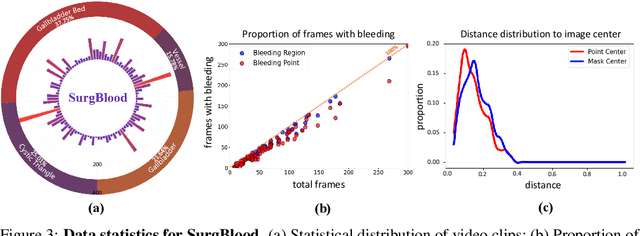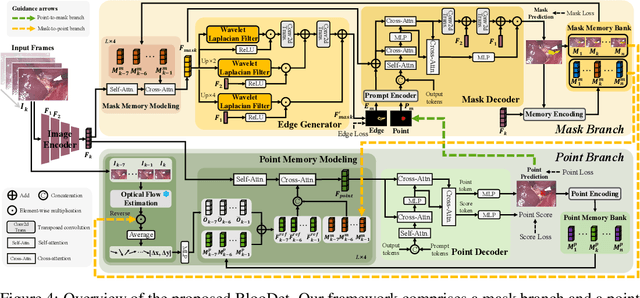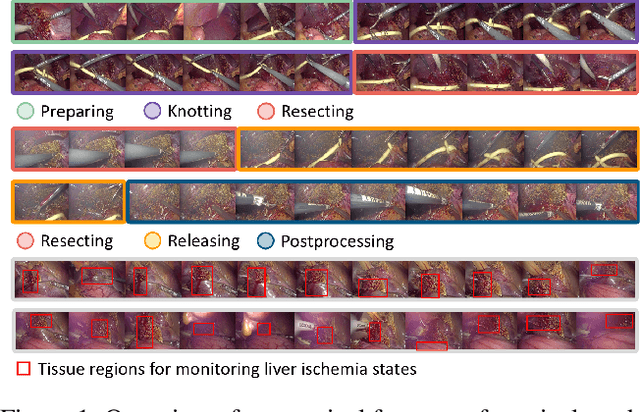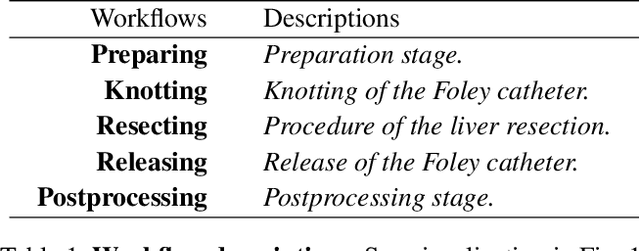Zhixi Li
Benchmarking Laparoscopic Surgical Image Restoration and Beyond
May 25, 2025Abstract:In laparoscopic surgery, a clear and high-quality visual field is critical for surgeons to make accurate intraoperative decisions. However, persistent visual degradation, including smoke generated by energy devices, lens fogging from thermal gradients, and lens contamination due to blood or tissue fluid splashes during surgical procedures, severely impair visual clarity. These degenerations can seriously hinder surgical workflow and pose risks to patient safety. To systematically investigate and address various forms of surgical scene degradation, we introduce a real-world open-source surgical image restoration dataset covering laparoscopic environments, called SurgClean, which involves multi-type image restoration tasks, e.g., desmoking, defogging, and desplashing. SurgClean comprises 1,020 images with diverse degradation types and corresponding paired reference labels. Based on SurgClean, we establish a standardized evaluation benchmark and provide performance for 22 representative generic task-specific image restoration approaches, including 12 generic and 10 task-specific image restoration approaches. Experimental results reveal substantial performance gaps relative to clinical requirements, highlighting a critical opportunity for algorithm advancements in intelligent surgical restoration. Furthermore, we explore the degradation discrepancies between surgical and natural scenes from structural perception and semantic understanding perspectives, providing fundamental insights for domain-specific image restoration research. Our work aims to empower the capabilities of restoration algorithms to increase surgical environments and improve the efficiency of clinical procedures.
Synergistic Bleeding Region and Point Detection in Surgical Videos
Mar 28, 2025



Abstract:Intraoperative bleeding in laparoscopic surgery causes rapid obscuration of the operative field to hinder the surgical process. Intelligent detection of bleeding regions can quantify the blood loss to assist decision-making, while locating the bleeding point helps surgeons quickly identify the source of bleeding and achieve hemostasis in time. In this study, we first construct a real-world surgical bleeding detection dataset, named SurgBlood, comprising 5,330 frames from 95 surgical video clips with bleeding region and point annotations. Accordingly, we develop a dual-task synergistic online detector called BlooDet, designed to perform simultaneous detection of bleeding regions and points in surgical videos. Our framework embraces a dual-branch bidirectional guidance design based on Segment Anything Model 2 (SAM 2). The mask branch detects bleeding regions through adaptive edge and point prompt embeddings, while the point branch leverages mask memory to induce bleeding point memory modeling and captures the direction of bleed point movement through inter-frame optical flow. By interactive guidance and prompts, the two branches explore potential spatial-temporal relationships while leveraging memory modeling from previous frames to infer the current bleeding condition. Extensive experiments demonstrate that our approach outperforms other counterparts on SurgBlood in both bleeding region and point detection tasks, e.g., achieving 64.88% IoU for bleeding region detection and 83.69% PCK-10% for bleeding point detection.
Surgical Workflow Recognition and Blocking Effectiveness Detection in Laparoscopic Liver Resections with Pringle Maneuver
Aug 21, 2024



Abstract:Pringle maneuver (PM) in laparoscopic liver resection aims to reduce blood loss and provide a clear surgical view by intermittently blocking blood inflow of the liver, whereas prolonged PM may cause ischemic injury. To comprehensively monitor this surgical procedure and provide timely warnings of ineffective and prolonged blocking, we suggest two complementary AI-assisted surgical monitoring tasks: workflow recognition and blocking effectiveness detection in liver resections. The former presents challenges in real-time capturing of short-term PM, while the latter involves the intraoperative discrimination of long-term liver ischemia states. To address these challenges, we meticulously collect a novel dataset, called PmLR50, consisting of 25,037 video frames covering various surgical phases from 50 laparoscopic liver resection procedures. Additionally, we develop an online baseline for PmLR50, termed PmNet. This model embraces Masked Temporal Encoding (MTE) and Compressed Sequence Modeling (CSM) for efficient short-term and long-term temporal information modeling, and embeds Contrastive Prototype Separation (CPS) to enhance action discrimination between similar intraoperative operations. Experimental results demonstrate that PmNet outperforms existing state-of-the-art surgical workflow recognition methods on the PmLR50 benchmark. Our research offers potential clinical applications for the laparoscopic liver surgery community. Source code and data will be publicly available.
A Novel Meta-Heuristic Optimization Algorithm Inspired by the Spread of Viruses
Jun 11, 2020



Abstract:According to the no-free-lunch theorem, there is no single meta-heuristic algorithm that can optimally solve all optimization problems. This motivates many researchers to continuously develop new optimization algorithms. In this paper, a novel nature-inspired meta-heuristic optimization algorithm called virus spread optimization (VSO) is proposed. VSO loosely mimics the spread of viruses among hosts, and can be effectively applied to solving many challenging and continuous optimization problems. We devise a new representation scheme and viral operations that are radically different from previously proposed virus-based optimization algorithms. First, the viral RNA of each host in VSO denotes a potential solution for which different viral operations will help to diversify the searching strategies in order to largely enhance the solution quality. In addition, an imported infection mechanism, inheriting the searched optima from another colony, is introduced to possibly avoid the prematuration of any potential solution in solving complex problems. VSO has an excellent capability to conduct adaptive neighborhood searches around the discovered optima for achieving better solutions. Furthermore, with a flexible infection mechanism, VSO can quickly escape from local optima. To clearly demonstrate both its effectiveness and efficiency, VSO is critically evaluated on a series of well-known benchmark functions. Moreover, VSO is validated on its applicability through two real-world examples including the financial portfolio optimization and optimization of hyper-parameters of support vector machines for classification problems. The results show that VSO has attained superior performance in terms of solution fitness, convergence rate, scalability, reliability, and flexibility when compared to those results of the conventional as well as state-of-the-art meta-heuristic optimization algorithms.
 Add to Chrome
Add to Chrome Add to Firefox
Add to Firefox Add to Edge
Add to Edge